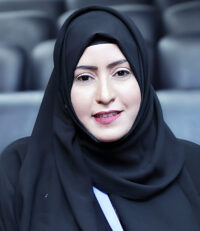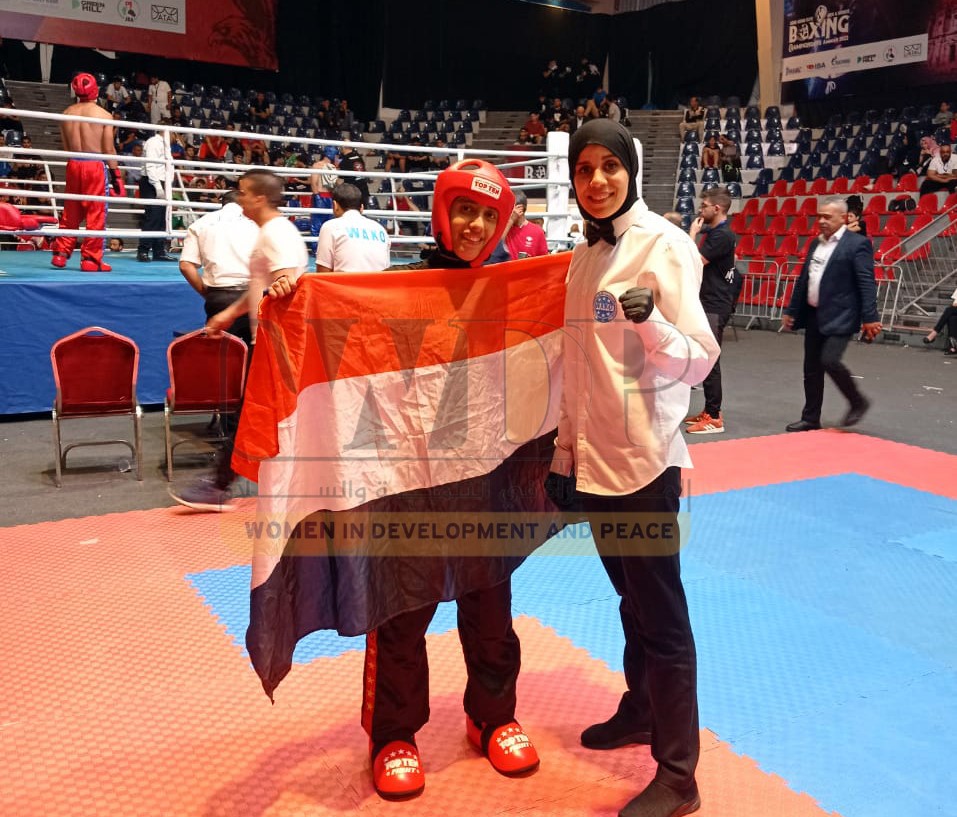
Safaa Al-Dub’i
Member of the Board of Directors of the Yemeni Union for Sports Media
Member of the Media Committee of the Yemeni Football Federation
“Women in Sports in Yemen” Advisor
Yemeni women can no longer boast about the excellence, brilliance, and success they once had in sports. They can no longer touch the laurels of glory and victory as they did in the past after their lives were surrounded by many annoyances and their dreams and aspirations were choked by many difficulties, especially since the beginning of the third millennium. But, from the rubble of “disappointments,” they strive to be at the forefront of the sports scene as they once were, even if they are often met with mountains of deterrents and rocks of obstacles.
Yemeni history is filled with many bright moments for a large number of women who have given themselves in a mold that combines beautiful presence and remarkable success, even compared to their male counterparts, in various fields. Among them were: the shrewd politician, the outstanding teacher, the prudent judge, the skilled doctor, the successful engineer, the prominent media personality, the struggling farmer, the heroic policewoman, the brave parachutist, the skilled pilot, and the virtuous educator. They remain defiant against defeat, refusing humiliation and refusing to submit and surrender to the shackles of backwardness and the fetters of isolation, behind customs and traditions that sought to suppress their rights and confine them to a specific corner, not meeting the reality that they are half of society and the active partner in building and developing it.
Despite all this, in the field of sports, they are still searching for themselves, looking through the pages of their days, despite the leap they achieved during the seventies and eighties of the last century, especially in some southern governorates, such as Aden and Abyan in particular.
Illustrious Names from the Memory of Women’s Sports
The seventies and eighties of the last century witnessed a great sporting movement for girls, which can be said to be the golden age of women’s sports in our country when the headquarters of sports clubs and the courtyards of preparatory, secondary, and university schools were teeming with many athletes in games such as volleyball, basketball, table tennis, athletics, chess, and others. This formed the nucleus of national teams in which Adeni women were present in Arab, Asian, and international competitions, achieving remarkable successes and tremendous leaps that have not been erased from the folds of memory despite the passage of years.
People in Aden still remember the prowess and heroism of table tennis stars “Naila Nasr,” currently a member of the Yemeni Olympic Committee, and her wonderful teammate “Fatima Muhammad Nasir,” and the brilliant “Majida Abdul-Majeed,” who achieved many Arab championships, before they passed the torch of excellence to the daughters of the famous athlete Faisal Sabri (Loai and Lina), who were also Arab champions in more than one championship and event. It is worth noting that the former is still connected to sports to this day, as she holds a high sporting position as “Vice President of the Yemeni Olympic Committee.” She is a certified referee by the Asian Federation in table tennis, in addition to her work as Director General of Women’s Sports at the Ministry of Youth and Sports.
All these names were able to carve out a niche for themselves in the hearts of sports fans through the great successes they achieved domestically and internationally, in addition to other champions in athletics, such as Hikmat Bartosh, Sina Thabit, Hanaa Ali Ahmad, and many others, without neglecting the stars of the national volleyball team and Al-Minaa Club in the past, such as Khairia Abdul-Wasi’, Faiza Abdul-Raqeeb, Nawal Hamood, Khizana Salim Rabi’ Ali, Nadia Yusuf, and the players of Shamsan Club: Firial Ja’far, Nadia Al-Jundi, Iman Izzi, and the players of the basketball team: Amira Hamood, Dikra Ahmad, Nawal Shafiq, Nadia Shaibani, and many others.
The Dwindling Landscape of Women’s Sports
Women’s sports in Yemen have declined significantly, despite the token presence in some friendly tournaments held here and there, especially before the conflict, under the name “Women’s Sports Federation.” It’s worth noting that there is no such name in the world; women’s sports and girls’ participation in any activity are through general game federations. However, these remain attempts to simply register a presence without competition.
It’s striking that in recent years, despite the apparent progress and advancement of Yemeni women in the field of women’s rights and gender equality, sports participation has seen a frightening decline and a noticeable regression. This is due to many reasons, most importantly: our conservative society’s lack of acceptance of women’s individual or team sports, the absence of dedicated spaces for them to practice, girls’ reluctance to participate in the absence of motivating factors, whether at the school, university, or club level, as well as the general lack of state interest in sports in our country, considering it a form of luxury, while politicians and those in charge of the country are preoccupied with other important matters. All these factors have extinguished the aspirations of many girls to practice and engage in sports.
Ambitions Killed by Customs
Women’s sports have remained shackled by tools of shame and disgrace for the past three decades, surrounded by the walls of customs and traditions that have prevented their launch, as is the case with many women in some countries and regions that have been swept by currents and winds of liberation and feminist movements. Meanwhile, laws in our country still echo with a lot of marginalization and a lot of incitement against girls’ sports and everything related to it, and there is a lack of societal awareness of this important issue.
To escape the marginalization that women’s sports are facing in our country today, we need to work on strengthening women’s participation in the sports sector and activating and revitalizing the “Women’s Sports Federation,” despite its legal illegitimacy. Following the adage, “If the only vehicle is a donkey, then the desperate have no choice but to ride it,” we must revive this federation. We need many years for everyone to understand that women’s sports fall under the general game federations. Therefore, it is imperative to work on reviving this federation, whose work has completely disappeared since 2011. It bears the responsibility of spreading the culture of women’s sports in schools, universities, and clubs, confronting customs and traditions that hinder women’s participation in sports, and holding numerous educational seminars for families to promote the culture of girls engaging in sports from a young age. They should also learn some martial arts for self-defense first, when necessary, and second, to become prominent athletes who contribute to raising their country’s flag in international forums.
It is also important to focus on telling the success stories of many inspiring female athletes who have had a significant impact on the sports scene and are considered role models. We should also establish partnership mechanisms with sports clubs to encourage and support girls to join sports clubs without discrimination and provide them with dedicated spaces to practice sports without complexes or problems.
Insufficient Efforts
The efforts currently being made by the Ministry of Youth and Sports to revive women’s sports by organizing some sporting events for girls, such as volleyball, tennis, chess, athletics, football, and others, remain insufficient and lack many of the ingredients for success. This is due to their lack of permanence and continuity, the absence of suitable places for girls, as well as the angry societal view towards women’s sports, the unjustified incitement by groups who do not understand or accept that women should have a presence in sports like men, and the lack of government support and attention compared to what women’s sports receive in Arab and international countries.
The Lack of Community Awareness
Culture and awareness of the importance of women participating in sports are crucial. This is where the media’s role in spreading sports culture within society becomes apparent. It’s noticeable that women’s sports suffer from weak media coverage. Several key reasons are contributing to women’s reluctance to engage in sports, including the lack of a family and community culture that emphasizes the importance of girls participating in sports. Additionally, the media itself doesn’t fully grasp the importance of its role in guiding, educating, and supporting women’s sports, lacking dedicated programs to address this issue. There’s also a deficiency in the roles of the Ministry of Youth and Sports, federations, and clubs, which should include activities and competitions targeting girls in their plans and programs. It’s also possible that women themselves are a major factor, as they often shy away from sports and avoid media appearances.
Recommendations and Suggestions
To bring women’s sports back to its former glory and catch up with neighboring countries that embraced sports long after ours, the government must give significant attention to women’s sports and allocate all necessary resources to support it. This includes building sports facilities for girls, supporting school activities as a foundation for development, attracting talented girls to sports clubs, and providing qualified coaches for them. It would also be beneficial to train former female athletes to become coaches, incentivize girls with monthly stipends, and open opportunities for them to participate in international events.
Furthermore, the media, in general, needs to highlight the importance of women engaging in sports as a vital community activity, dedicating space in visual, print, audio, and online media to cover women’s sports and encourage girls to participate in various sports. Additionally, launching a monthly sports magazine focused on women’s sports could help women enter the world of sports journalism as editors and writers. There should be greater attention to women’s sports issues than currently exists, with the Yemeni Olympic Committee being obligated to fulfill its role in promoting women’s sports and fostering Olympic champions. Our country is rich in talent from both genders if this is achieved, and the journey should begin in schools. Can we hope for this?

